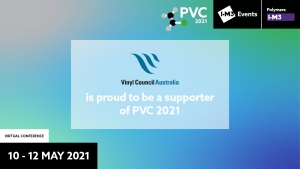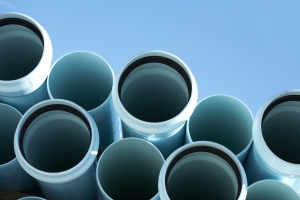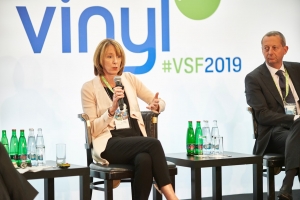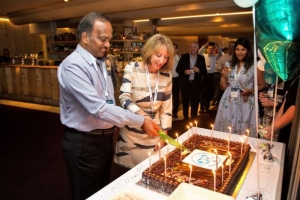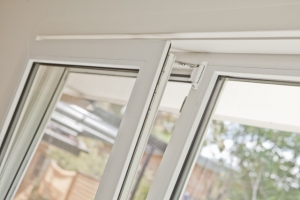Global technical conference PVC 2021 goes virtual
The UK-based Institute of Materials, Minerals and Mining (IOM3) has announced it will be moving its triennial global conference, PVC 2021 to an online format.
Focusing on 'Success and Innovation in the Circular Economy', it will run as a fully interactive, virtual conference experience between 10 and 12 May 2021, with emphasis on delivering the exceptional engagement, networking and knowledge exchange between participants, for which the PVC conference series is renowned.
The Vinyl Council of Australia is again proud to partner with this leading event for the vinyl industry.
Usually staged in the UK, as a virtual conference this year, it offers a chance for more participants in the Australasian PVC industry to attend, with the possibility of creating a personalised schedule, networking with attendees (instant chat feature), visiting exhibitors and joining sessions at a click of a button. Registration offers on-demand access after the event and a book of detailed technical conference papers.
Dr Jason Leadbitter, Chair of the PVC organising committee and Sustainability and Corporate Social Responsibility Manager at Inovyn, says, ‘I’m delighted to see the relaunch and opportunity for a fully virtual event that provides a unique opportunity to have the highest-ever participation to either watch live or via immediate streaming. PVC 2021 presents a great opportunity – there is really no excuse to miss out on any presentation.’
PVC 2021 is the world’s leading conference on Vinyl and this year’s theme will focus on ‘Success and Innovation in the Circular Economy,’ with an impressive line-up delivering a current, comprehensive and wide-ranging technical programme with 60 papers covering seven technical sessions, with speakers and discussion opportunities in between.
IOM3 CEO Dr Colin Church CEnv FIMMM, says, ‘The PVC conference series is rightly praised for the extremely high standard of its technical content, and going virtual means this will be accessible for a wider audience than ever. Coupled with the exciting networking opportunities the virtual conference platform offers, PVC 2021 will be an unmissable event for all in the sector.’
Registration to attend PVC 2021 is now live. To find out more about this year’s event and to register, visit www.iom3.org/events-awards/pvc-2021.html
The value of product stewardship
In the current business climate, the application of product stewardship has much to offer to individual businesses, industry collectives and governments seeking to drive sustainable economic growth.
This has been brought into a sharper focus in recent times due to the global economic downturn triggered by the covid-19 pandemic which has led many businesses and governments to recognize the level of economic dependence they have on offshore suppliers and markets, including for waste materials. This, coupled with the impact of the China National Sword policy, has the potential to stimulate new ways of thinking and smarter approaches to business and economic management and prosperity. One such approach, and one that has considerable merit, is product stewardship.
Product stewardship is defined as “the principle that everyone involved in a product supply chain - including raw material and component suppliers, product and packaging manufacturers, brand owners, recyclers, governments and consumers - share responsibility for minimising environmental impacts over that product’s life cycle” . Product stewardship can therefore make a significant contribution to the circular economy. Stewardship, at its best, takes a life cycle thinking approach to ensure products and materials are designed to avoid adverse impacts on society and the environment and that the resources consumed are retained within the productive economy in a cyclical manner.
The Vinyl Council, through its PVC Stewardship Program, has been at the forefront of this journey in Australia for quite some time. The Program commits Signatories to implement life cycle thinking and consider the whole-of-life impacts of the products that they introduce to the marketplace. This encompasses a wide range of considerations including raw materials and resources, embodied carbon, toxicity, and lifespan. This has resulted in the sector producing products that deliver proven environmental benefits, as a function of their excellent performance, durability, low waste generation and affordability which has been borne out through numerous lifecycle assessments carried out globally and locally.
Furthermore, when stakeholders collaborate, opportunities arise for better resource management, which in turn can stimulate local employment and deliver greater security and access to the inputs needed by local manufacturers. The Vinyl Council is pleased Federal and State Governments have recently announced funding programs which may provide opportunities to bring together innovators and entrepreneurs to develop new systems and infrastructure, or products, which will lead to enhanced recovery and reprocessing of greater volumes of PVC for the domestic market.
The Council firmly believes that a product stewardship focus can translate into tangible financial and reputational benefits for those organisations that embrace and commit to implementing product stewardship approaches. These benefits are evident both in the public realm but also in the disciplines it enforces on organisations in terms of how they manage and monitor their day to day operations.
Furthermore, acting as leaders through product stewardship delivers:
- Differentiation in the marketplace that leads to competitive advantage. Establishing stewardship credentials through independent third-party schemes, as the PVC program does, demonstrates not only a company’s commitment to continuous improvement but may also differentiate it from competitors. Increasingly, down-stream customers want to know how their suppliers manage their environmental affairs. Independent and third-party verified schemes enable those involved to spruik their credentials and demonstrate their accountability and
transparency. - Access to markets. At present, governments at all levels are reviewing their procurement frameworks and policies to examine how these systems can be used to support and stimulate circular economy objectives, including boosting demand for recycled content products. In doing so, governments are likely to preference those businesses who are members of recognised and reputable product stewardship schemes. This will facilitate access to markets for those businesses participating in these stewardship schemes.
- Reducing liability. A company is best positioned when it understands its products holistically. Product stewardship, particularly a life cycle-based scheme, fosters a proactive approach within businesses to consider the supply chain risks and the various lifecycle stages of the products they are releasing into the market. It therefore reduces risk and better prepares them for future challenges.
- More effective business management. Implementing product stewardships schemes within businesses imposes disciplines around establishing appropriate systems that enable organisations to measure performance, monitor outcomes and control direction. This can aid in minimising risks, enhancing profitability as well as in fulfilling obligations in relation to regulatory compliance.
- Strengthening organisational culture. Embedding environmental and social sustainability as core values of a business’ operations can support buy-in and pride from its workforce.
With a significant track record of driving change through the industry since 2002, the PVC Stewardship Program is an example of voluntary stewardship bringing benefit to both industry and community.
If you are an Australian business operating in the vinyls product sector and are interesting in learning more about our PVC Stewardship Program, please don’t hesitate to contact us on 03 9510 1711.
For our latest results, please check out our annual Progress Report.
Supporting the delivery of essential services during COVID 19 restrictions
The PVC industry in Australia is crucial to the delivery of several essential services in the Australian economy.
Approximately three quarters of the local PVC industry is engaged in the manufacture and distribution of products for essential utility services including potable water, stormwater management and sewer services, energy and telecommunications delivery, plastics recycling and key construction products for major projects such as healthcare facilities.
Others in the sector produce essential processing chemicals and compounds, specialist food packaging and vital medical products, manufactured here in Australia.
The local industry directly employs over 2,500 people and contributes well over $3 billion to the national economy. PVC products contribute to virtually every sector of the economy and it is vital that the industry remains operational through this Covid19 pandemic.
Nevertheless, the safety and well-being of the industry's employees and customers is paramount. Members of the Vinyl Council of Australia are implementing appropriate measures to protect their workers, contractors and customers from risk of exposure at their work places, and will continue to ensure the safety of their operations.
Partnerships aid progress in vinyl sustainability
Global vinyl industry partnerships are driving progress in the sustainability of the Australian PVC industry, resulting in the creation of successful initiatives such as best practice manufacturing, product stewardship and recycling.
Sophi MacMillan, Chief Executive of the Vinyl Council of Australia and a member of the Global Vinyl Council, believes that partnership is ‘absolutely integral to the work that we do as an association focused on sustainable development of the industry’.
During a panel discussion at the recent VinylPlus Sustainability Forum 2019 held in Prague, Czech Republic, Sophi emphasised the importance of partnerships for sharing knowledge, experience and strategies with experts from all the regions of the vinyl world.
“Attending the Global Vinyl Council meeting and the European Vinyl Sustainability Forum provides a great opportunity to build connections across the industry beyond Australia and our region. For the Australian vinyl industry, which is a small market, partnerships have been essential to us to move forward, to be able to tap into the knowledge of people, particularly in Europe and the US.
“It’s these connections that help us to develop our voluntary, industry PVC Stewardship Program and our initiatives around recycling, as well as sharing ideas and best practice.”
The Vinyl Sustainability Forum, organised by VinylPlus, the voluntary sustainable development commitment of the European PVC industry, attracted more than 170 participants from 32 countries to share further progress towards advancing the sustainability of the industry and its products.
Sophi continued: “Europe’s VinylPlus program is a leader in striving towards sustainable goals across the whole vinyl industry supply chain. Here at the Vinyl Council of Australia we follow in their footsteps with our own PVC Stewardship Program that has driven continual improvement in the vinyl industry for 17 years. We see stewardship as being a shared responsibility, so it is about working with, not just industry members, but also stakeholders - particularly government and NGOs - and trying to establish constructive partnerships.
“It’s about being aware of different epistemologies – different ways of knowing – which can help us to remove blinkers, to understand and characterise issues and develop paths to address them.”
Nowhere is this more important than in addressing the need for the industry to engage in the circular economy. Sophi highlighted their successful PVC Recycling in Hospitals Program, which now has 175 hospitals across Australia and New Zealand participating in the collection of PVC medical products for recycling back into new products, and through collaboration, is being implemented in other countries such as South Africa, the UK and Thailand.
In Australia, partnering with medical devices manufacturer Baxter Healthcare, PVC recyclers, medical waste collection companies, state governments and health authorities has been essential to developing and successfully delivering the program.
Sophi added: “Collaboration with the nurses and midwives’ union has also been very helpful in terms of finding pathways to engage nursing staff and to develop training on which medical products are recyclable under the program.”
A further example was given of the Council’s partnerships with academia such as Monash University and manufacturers in the development of product concepts for vinyl recyclate.
The Vinyl Council would like to see such wider collaboration form between stakeholders, particularly end-user brands, in the broader plastics packaging space.
“By working together, we have more knowledge, more ideas and are better equipped to find solutions to seemingly intractable problems.”
Vinyl Council of Australia celebrates 20th anniversary
The Vinyl Council of Australia is celebrating its 20th anniversary this year amid on-going progress in guiding the continuous improvement and sustainable development of the Australian PVC industry.
Founded in 1998, the nation’s peak association for the PVC value chain has made great strides in changing perceptions and advancing the material’s sustainability over the past two decades.
Key achievements include the 2002 launch of the PVC Stewardship Program (PSP) that has been fostering advancements in innovation and sustainability throughout the Australian PVC industry, for both locally-made and imported products and the introduction of the Best Practice PVC third party accreditation scheme for products.
Recognised in rating tools such as Green Star and public and private procurement policies, Best Practice PVC requires strict compliance and has driven change through product global supply chains.
Acknowledged as one of the longest-standing product stewardship programs in Australia with a full life cycle approach, the PSP currently has 47 Signatories representing the majority of the Australian PVC industry. All are committed to driving positive measurable change in five key areas, such as transparency, resource efficiency and safe and sustainable use of additives.
The information and data collected through the program has helped inform industry and stakeholders, influence product design and ensure the Australian PVC industry continues to innovate.
Industry successes include the most stringent manufacturing benchmarks for raw material suppliers; a 98% reduction in lead additive use by Signatories since 2002; compliance by 90% of Signatories with the PVC Industry Energy and Greenhouse Gas Emissions Charter; growing use of PVC recyclate in products placed in the market; research and development of innovative solutions for recycling PVC coated fabrics; and initiation of the recycling of medical devices. As the program evolves year to year, industry is driven to improve performance and reduce the environmental footprint of vinyl products along the entire value chain.
The Council’s thriving PVC Recycling in Hospitals program now operates in 160 hospitals throughout Australia and New Zealand, recycling more than 200 tonnes of high-grade PVC waste each year into new goods, such as playground mats and garden hose. Design of new product applications for the recyclate is currently being explored.
Vinyl Council Chief Executive Sophi MacMillan comments: “We have made major progress over the past two decades with some significant breakthroughs, both in how PVC is perceived and how it is increasingly being specified for sustainable applications. Through our ‘whole of life approach’ to PVC stewardship, today’s vinyl is a sound material choice.”
We have achieved this as an industry, continues Sophi, by ‘working together through a public voluntary commitment to address key aspects of the product life cycle based on credible science and life cycle assessments’.
As a low carbon and durable plastic, PVC provides solutions through its track record of stewardship, alignment with several global Sustainability Development Goals and its potential for circularity. Each tonne of recycled PVC will replace about one tonne of virgin PVC compound in new products, consuming 80% less energy and reducing carbon emissions.
In providing the platform to share information and engage with stakeholders, the PSP has developed partnerships and collaborations that are driving change through the industry and better understanding of supply chains for vinyl products placed on the Australian market.
Sophi adds: “In our 20th anniversary year, we are immensely proud of how far we’ve come on our continuous and evolving journey towards a circular economy for vinyl.”
Developing Affordable Passive Houses in Australia
A new house in a Melbourne suburban street has demonstrated that affordable Passive House construction looks within reach in Australia.
Until now passive houses were priced well beyond the means of ordinary Australians, and scared off both builders and home buyers. But retirees Sue and Peter, builder RMH homes, passive house certifier Grun Consulting, and uPVC windows supplier VUE Windows have produced an elegant, spacious home that looks like any normal new build. Unlike those normal new builds, however, the home will produce stellar results in terms of thermal comfort and energy efficiency. In doing so, they have opened the door to more affordable, comfortable, high performing homes in Australia.
The house features an expansive wall consisting of 32.45 square metres of uPVC double glazed windows and doors across the north-facing living and kitchen areas, including openable fanlight windows at ceiling height for purging hot summer air.
The argon filled double glazed uPVC windows achieve excellent insulation value of Uw 1.37 and a solar heat gain co-efficiency (SHGC) of 0.58, allowing winter sunshine to penetrate but not too much solar radiation in summer.
Read the full article about this house, published in Sourceable.net.
In Construction - PVC Building Solutions - Floor and Wall Coverings
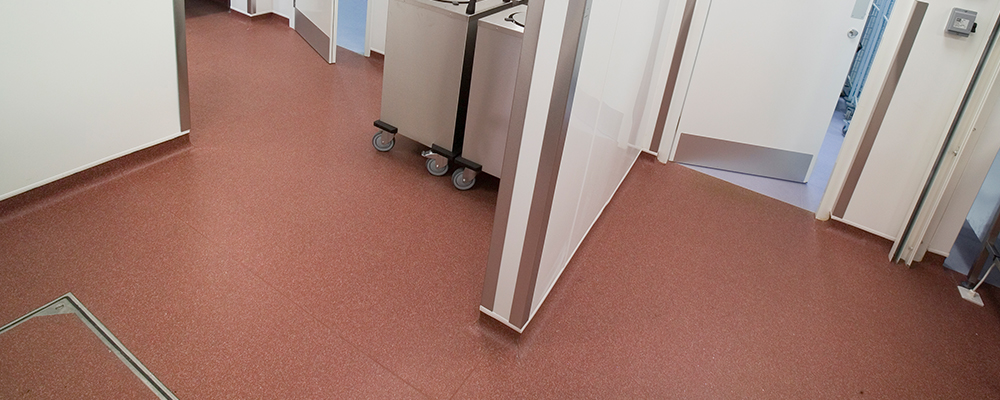
Floor and Wall Coverings
Vinyl floor coverings
PVC is the most common polymer used for sheet and tile flooring. Vinyl resilient flooring is widely used in Australian hospitals, schools, sporting clubs and commercial kitchens where slip resistance and high levels of safety and hygiene are required. It is hard wearing, warm underfoot, cost-effective and easy to keep clean as it has a pore-free surface.
Vinyl floors are low maintenance, need no polishing or treating and are hygienic and fire resistant. Sheets are joined together by heat welding which prevents water or moisture from seeping through gaps and therefore are ideal for wet floor areas such as in healthcare facilities.
Resilient vinyl flooring - both sheet and tile - has become a valued design tool for many interior designers and architects, particularly those designing for heavy-traffic locations such as retail stores, or for rooms where hygiene is especially important such as a hospital operating room.
Find out Why vinyl is the right choice for hospital flooring
Vinyl coated wall papers
Vinyl coated wallpapers and fabrics offer durable, long lasting, washable wall coverings.
The product is commonly made by applying a liquid coat of hot PVC over a paper base. Alternative types include those where a solid sheet of decorative vinyl is fixed to a paper backing, and those where fabric is laminated with a solid vinyl sheet.
All are easy to clean and resistant to heat and humidity making them a good choice for kitchens and bathrooms. They are also easy to strip from walls.
Use of vinyl wall coverings has had a resurgence for both residential and commercial interiors, driven by interior designers and architects seeking more original and exciting design options. The reasons for vinyl's growth are both aesthetic and practical - vinyl wallcoverings offer a wide range of finishes and colours with enhanced durability.
About Us
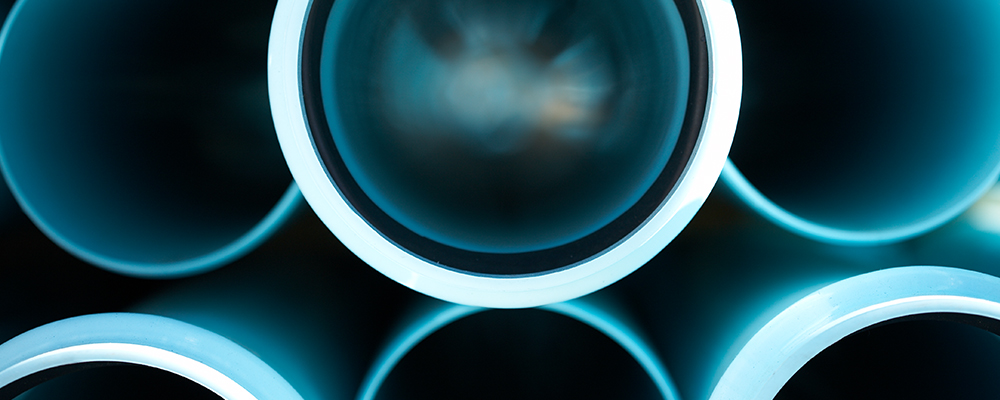
Vinyl - Part of the Solution
The Vinyl Council of Australia believes that vinyl products have a valuable role to play in a sustainable society.
The Council is a member-based organisation established in June 1998. It acts as the peak organisation representing the Australian PVC, or vinyl, value chain. Our members are drawn from across the supply chain of the vinyl industry in Australia, representing a wide range of products.
The Vinyl Council is working to advance the sustainability of the PVC industry in Australia through sharing information on, and engaging with stakeholders regarding the life cycle of PVC.
The Council advocates the responsible manufacture, use and disposal of PVC products. It aims to foster cooperation between member companies, governments and organisations to increase the understanding of the PVC life cycle.
The Council provides leadership to its members in Product Stewardship and best practice models to encourage industry advances and operation to the highest standard.
The Council provides members with a forum where they can seek information and support for the advancement of the industry.
Not yet a member? Learn more or contact us to discuss This email address is being protected from spambots. You need JavaScript enabled to view it.

As part of the VCA’s ongoing commitment to environmental responsibility and the sustainable development of the Australian PVC industry, we have taken the Operation Clean Sweep (OCS) pledge.
The VCA continues to work with our members and their supply chains to work towards the goal of zero pellet loss and encourages our members to make the pledge as well.
We are proud to be a partner of the program and to play a role in protecting our natural environment alongside many other organisations in Australia and abroad.
For more information on the program, visit the Operation Clean Sweep Australia website.




